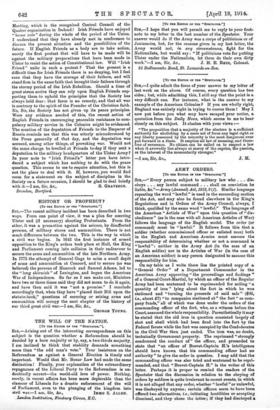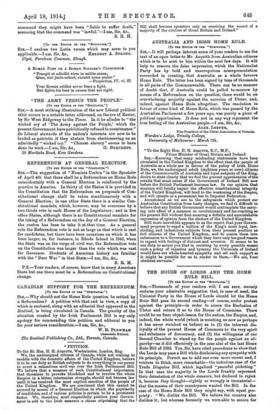ARMY ORDERS.
[To rum EOM. or Tux “Srscrarou.'1 Sra,—" Every person subject to military law who . . . dis- obeys . . . any lawful command . . . shall on conviction be liable, &o."—Army (Annual) Act, 1913, 9 (1). Similar language repeating the word "lawful" is used in the succeeding section of the Act, and may also be found elsewhere in the King's Regulations and in Orders of the Army Council, always, I think, qualified by the same word " lawful." The language of the American "Article of War" upon this question of " dis- obedience" (as is the ease with all American Articles of War) follows the language of the English model. The order (or command) must be "lawful." It follows from this that a soldier (whether commissioned officer or enlisted man) both in the English and American Armies must assume the responsibility of determining whether or not a command is "lawful": neither in the Army Act (in the case of an English soldier) nor in the Articles of War (in the case of an American soldier) is any person designated to assume this responsibility for him.
On my table as I write there lies the printed copy of a "General Order" of a Department Commander in the American Army approving " the proceedings and findings " of a General Court-Martial, by which an officer of the Regular Army had been sentenced to be reprimanded for• selling " a. quantity of iron" lying about the fort in which he was stationed and " turning the proceeds of said sale" ($36, i.e., about £7) "to companies stationed at" the fort" as coo- puny funds," all of which was done under the orders of the commanding officer of the fort, who, as a witness before the Court, assumed the whole responsibility. Parenthetically it may be stated that the old iron in question consisted largely of shot and shell which had been fired into the fort by the Federal forces while the fort was occupied by the Confederates in the Civil War then just ended. The iron was, no doubt, technically Government property. The reprimand " strongly condemned the conduct of" the officer, and proceeded to state that "an officer of Brevet-Captain H.'s intelligence should have known that his commanding officer had no authority" to give the order in question. I may add that the commanding officer was also tried and sentenced to be repri• mended, and that "Brevet-Captain H." is the writer of this letter. Perhaps it is proper to remind the readers of the Spectator that the discussion in relation to the obeying of orders by soldiers is quite irrelevant to recent events, in which it is not alleged that any order, whether " lawful "or unlawful, was disobeyed by anyone; certain officers seem to have been offered two alternatives, i.e., initiating hostilities or accepting dismissal, and they chose the latter; if they bad disobeyed a
command they might have been "liable to suffer death," assuming that the command was " lawfuL"—I am, Sir, &c., S. R. H.











































 Previous page
Previous page